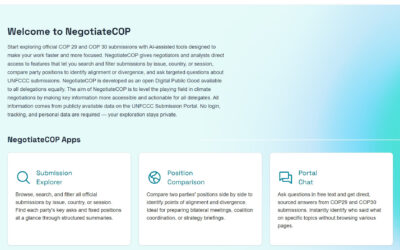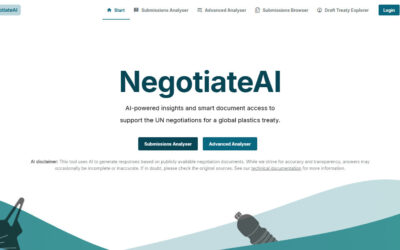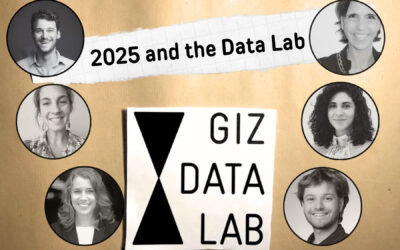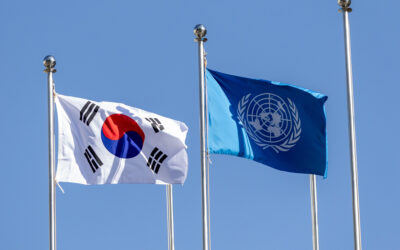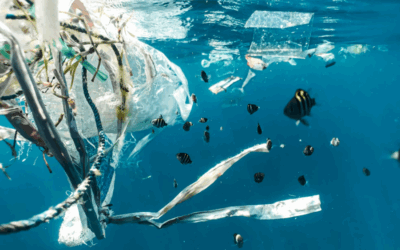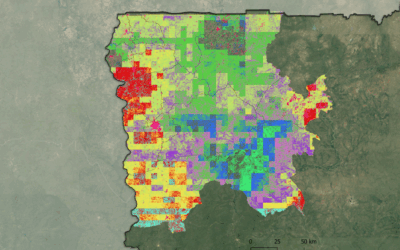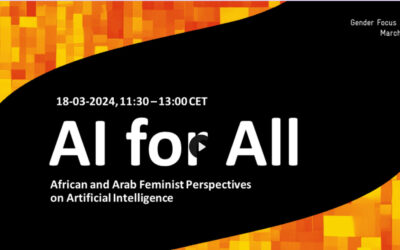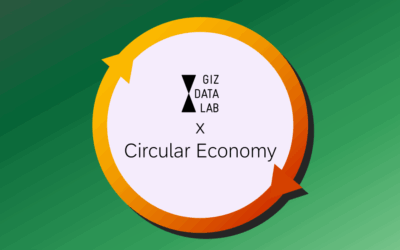Dear colleagues and friends, As the year comes to a close, as usual we wish to take a moment to reflect on our journey and share our plans for the upcoming year. In this time grappling with uncertainty, we have tackled new projects, connected with many remarkable...
NegotiateCOP
Check out the video about the tool.Right on time for the 30th annual Climate Conference (COP30) in Belém, we launched our new tool “NegotiateCOP” that assists delegates navigate the extensive volume of documents submitted to the UNFCCC submission portal by more than...
Exploring Scalable Practices Towards Tree Conservation: Results from a Data Powered Positive Deviance Study in Northern Ghana
Introduction Climate change is severely impacting rural agricultural communities, particularly in developing countries, by disrupting farming practices, reducing crop yields, and threatening livelihoods. Rising temperatures, erratic rainfall, and extreme weather...
NegotiateAI 3.0 – Now Live on Its Own Domain
Just in time for the resumed negotiations of the UN Plastics Treaty in Geneva this August (INC-5.2), we’re pleased to announce the official launch of NegotiateAI 3.0. The tool is now available on a dedicated domain: www.negotiate-ai.com Originally developed by...
2025 and the Data Lab – What keeps us moving?
A reflection of our efforts in the last year and projects that excite us in the coming year. Dear colleagues and friends, As we look toward 2025, we are filled with enthusiasm and determination to continue our mission of leveraging data and technology for positive...
NegotiateAI: Reflections on Recent Plastic Treaty Negotiations, Progress, and Empowering Smaller Delegations in Global Negotiations
Introduction Since our initial blog post on NegotiateAI in June 2024, we have made significant steps in both the app's development and its application within international negotiations. Notably, we have introduced a brand-new frontend design, added key...
Launching the Data-Powered Positive Deviance Course
We're excited to launch our self-paced online course on Data-Powered Positive Deviance (DPPD). Take the course and learn how to leverage digital data to identify and learn from successful practices to tackle complex challenges.Why are we offering this course? In...
NegotiateAI: Smart Negotiations by leveraging AI for UN Negotiations on the international legally binding instrument on plastic pollution
Update: NegotiateAI 3.0 is now available under its own domain - the Hugging Face version has been deactivated.Introduction In the dynamic world of international environmental diplomacy, the complexity of the subject, variety of diverging positions as well as volume of...
From Pixels to Preservation: Utilizing Remote Sensing to Identify Community Techniques to Save Tree Cover
Climate change poses significant challenges for rural communities in the North of Ghana. Due to their dependence on climate-sensitive sectors like agriculture, forestry, and natural resource management, they are highly vulnerable to its effects. Implementing...
AI for All – African and Arab Feminist Perspectives on Artificial Intelligence
AI, Global Tech and the Need for Feminist Arab and African Perspectives Recent dynamics in AI development have fired euphoria and dystopian fears alike. AI’s interaction with gender relations and complex inequalities is still largely neglected. Feminist AI therefore...
Unveiling Vulnerabilities in Climate Policy: AI Tools for Insights into Climate Policy Inclusivity
The consequences of the climate crisis are affecting people across the world, but it is well-known that people in vulnerable situations (due to factors including but not limited to age, gender, geography, health or indigenous or minority status) may experience...
Season’s Greetings from the GIZ Data Lab 2023
Dear colleagues and friends, As the curtain falls on 2023, it's time for us to reflect on yet another exciting journey we've had this year. In a world grappling with conflicts, crises, and pressing global issues, our Data Lab team has been busy pioneering solutions...
Season’s Greetings from the GIZ Data Lab 2022
A year of change for the GIZ Data Lab: the GIZ Data Lab 2.0. and its members What a year it has been... again! Besides focusing on many new partners, experiments and topics, the Data Lab was busy setting up an almost completely new team – The Data Lab...
Data-Powered Circular Economy – From Unstructured Data to Positive Outcomes
Amid geopolitical turmoil and the global impacts of climate change, leaders around the world are increasingly turning to the circular economy as a conceptual framework to align human activities with planetary boundaries. In a circular economy, the value of...



